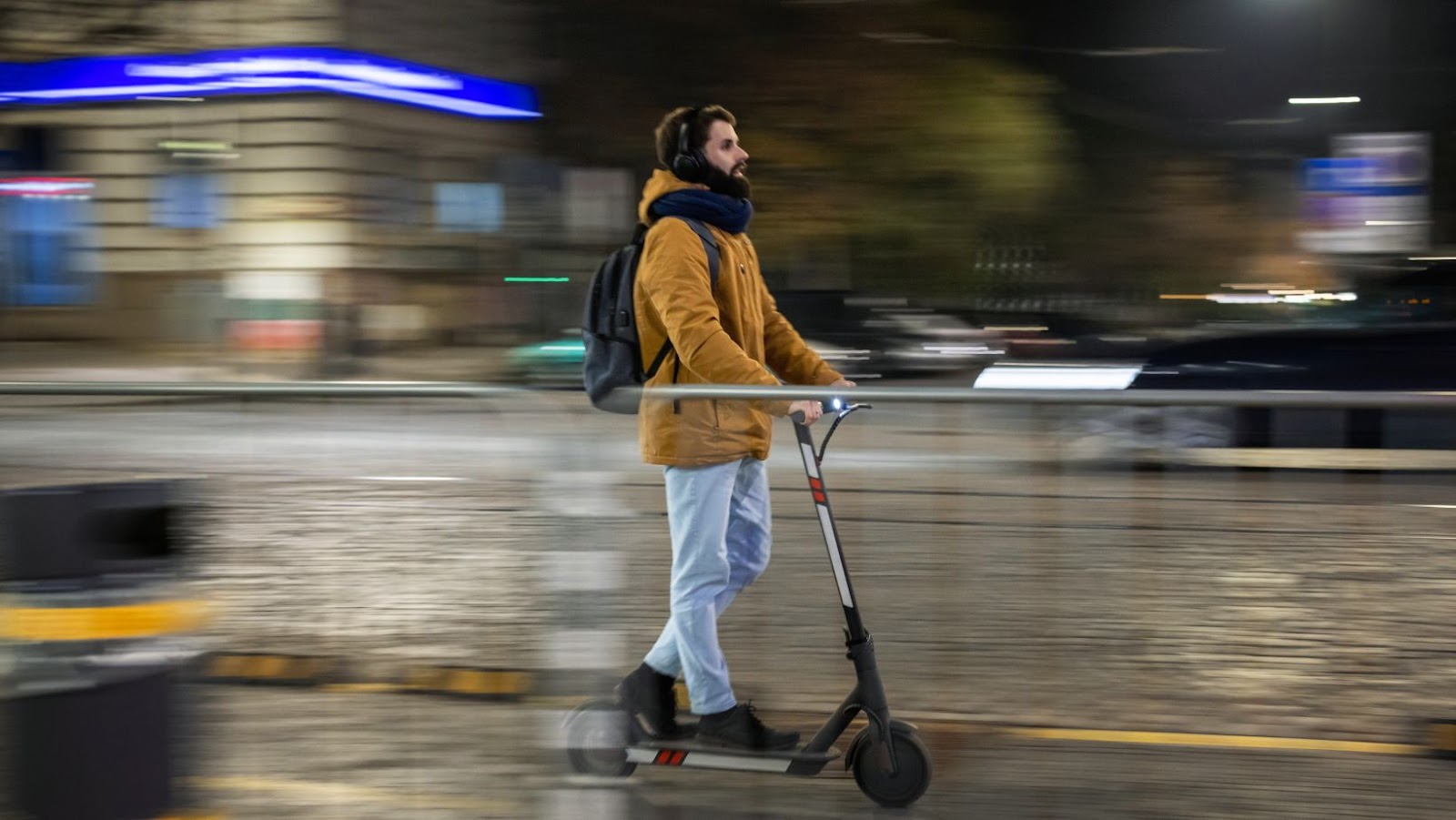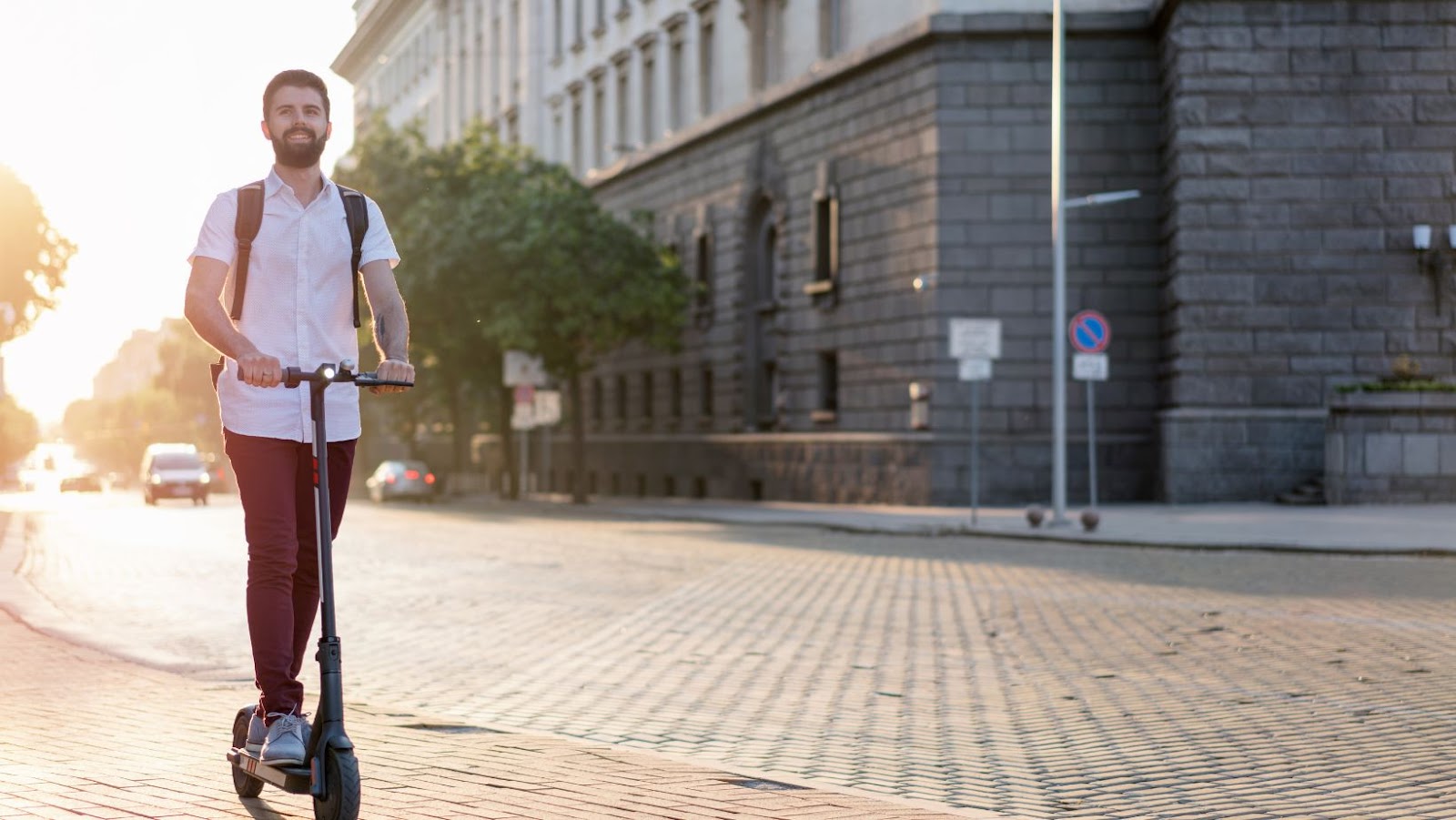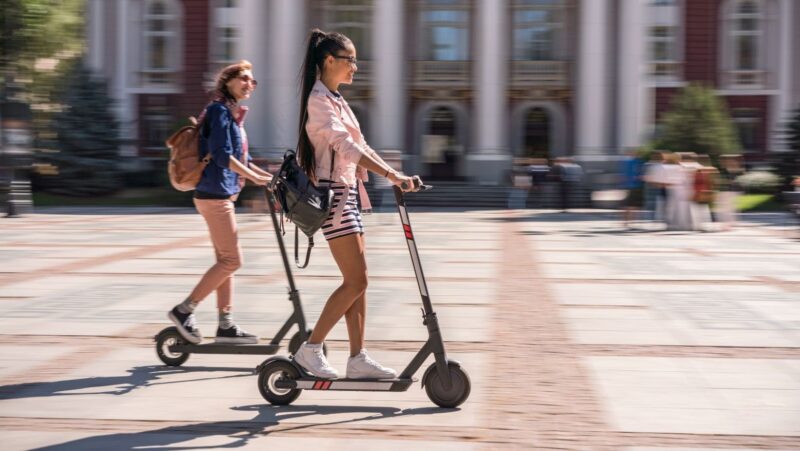Transport for London (TfL) and London Councils today announced the start of London’s e-scooter trial which will run from June 2021 to March 2022.
The e-scooters are designed to provide a safe and convenient alternative to public transport for Londoners, focusing on ensuring all users’ safety.
This trial is a major step forward for London’s transport network as it expands its commuter options.
TfL Press Release – TfL and London Councils announce London’s e-scooter trial will begin in June
Transport for London (TfL) and 20 London boroughs have announced an initial trial of e-scooters across the capital. The 12 month trial, to begin in May 2021, follows an earlier announcement by the UK Government in its Global Future Mobility Zones programme.
The e-scooter trial is designed to provide a cleaner, quicker and safer way to travel short distances around London. Introducing e-scooter trials into cities has been successfully implemented in other major cities such as Paris, Madrid and Los Angeles. It provides a convenient option for commuters, leisure travellers or cycle enthusiast.
Participating London councils will be responsible for setting up and managing the operation of rental e-scooters across their areas. TfL will coordinate the operation of these vehicles with local authorities and support them from a safety perspective including developing an online safety training program for riders. In addition, TfL will work with companies to encourage them to participate in this trial with suitable payments for successful implementation of their e-scooter sharing programs.
To protect pedestrians, trials are restricted to low speed streets with additional limits set on maximum speed of 15mph (25 km/h) near schools or vulnerable road users (cyclists or pedestrians). Signage will also be erected throughout potential routes outlining any route restrictions that may be imposed due to congestion points or road closures.
TfL and London Councils Announcement
On the 18th of May 2021, Transport for London and London Councils announced that London’s e-scooter trial will begin in June. This is part of a wider initiative designed to reduce congestion in the capital and cut emissions of harmful pollutants.
The trial will involve applying for a license to operate e-scooters as part of a public transport system in the capital.
Read on to learn more about this exciting new initiative.
Overview of the trial
Transport for London (TfL) and the Mayor of London, Sadiq Khan, alongside London councils, have recently announced plans to launch an e-scooter trial in London starting in 2021. This initiative will enable people to rent electric scooters traveling up to 15 mph through designated areas.
The e-scooter trial will run over 18 months across six boroughs, including Ealing, Enfield, Greenwich, Kingston upon Thames, Richmond upon Thames and Tree borough. The trial aims to provide a cost effective and sustainable improved transport alternative for commuters within the capital. The growth in the e-scooter market is estimated to be worth £312 million by 2025.
To ensure safe use of the e-scooters on public roads in the capital, users must abide by a series of regulations set out by TfL and their local council before using one of the electric scooters. The regulations include wearing a helmet at all times while using an e-scooter and ensuring they have read guidelines set out online before using.
Details of the trial
Transport for London and London Councils welcomed the announcement from the Department for Transport allowing e-scooter trials to begin in the capital from April 12 2021. The trial has been launched to explore if e-scooters can provide a safe and efficient way of getting around the city, helping reduce congestion and improve air quality.
The one-year program will be overseen by TfL and will involve limited numbers of rental e-scooters made available in many boroughs. Participants in the trial must be over 16, hold a valid UK driving licence, have third party insurance, use helmets and ride only within designated boundaries.
In addition to this, all participating e-scooter operators must pass rigorous safety assessments on their scooters with established standards set by TfL to participate in this trial. Those who fail to meet these requirements will not be allowed on London’s roads or footpaths. Further information about these stringent safety requirements can be found on TfL’s website.
TfL will closely evaluate how the trials proceed over their course, but there are no plans to extend them beyond April 2022.
Benefits of the E-Scooter Trial
In June 2021, a 12 month e-scooter trial in London being organised in partnership with TfL and several London councils was announced.
This trial has potential to offer a range of important and beneficial outcomes, both in terms of transportation and the environment. These benefits will be explored in more detail in this article.

Reduced congestion in the city
A key benefit of the e-scooter trial is the potential to reduce congestion in urban areas. E-scooter trials seek to enable cleaner, quieter and more efficient ways of getting around cities. As more e-scooters are used in busy urban spaces they could help reduce congested traffic on the roads, improve air quality, free up public transport capacity and provide a greener way to make short journeys.
An e-scooter provides a greater range than walking and can be faster than bicycling in some places due to fewer obstacles such as hills or traffic lights. It’s estimated that over 100 billion journeys are made on foot each year and 60% of these could be made by an electric scooter instead – this could significantly contribute to reducing city centre congestion levels.
Rideable electric scooters also offer increased safety benefits for cyclists, pedestrians and other disabled groups by speeding up journey times and eliminating individual vehicles from the roads. Although this solution is currently in its pilot phase, long term data insight will help inform whether or not these rideshare schemes reduce infrastructure costs by cutting local congestion levels across London’s boroughs.
Improved air quality
The E-Scooter trial in London, initiated by Transport for London (TfL) and the 32 borough councils has the potential to significantly reduce congestion and improve air quality throughout the capital. The trial seeks to explore whether this innovative form of transport can help reduce the 40% of car journeys under 2 miles and support Londoners’ need for Micro Mobility.
As a zero emission form of transportation, e-scooters have the potential to play an important role in helping reduce harmful emissions from road transport. Vehicle emissions account for significant air pollution in cities, causing smog and other health problems for nearby people. Electric scooter users will be able to help improve local air quality immediately, as emissions from using electric scooters will be negligible or non-existent (depending on how their battery is charged).
The trial also hopes that traffic congestion in LaLondon can be reduced as more commuters choose e-scooters over cars – freeing up road space for buses, cyclists, pedestrians and other public transport. The new Mayor of London has pledged to fight air pollution which often causes children’s asthma, lung cancer and heart disease amongst others severe health risks, with TfL striving to ensure that vehicle emission levels are eliminated by 2030. E-scooters may therefore play a major role in achieving those goals.
Increased access to green transport options
Electric scooters (e-scooters) are becoming more popular in the UK. As part of the upcoming trial of rental e-scooters in London, Transport for London (TfL) and London councils are trialling various innovative transport options. The initiative aims to increase access to green transport options, such as electric motorbikes, in the capital.
The benefits of the trial include increased safety, improved air quality and reduced congestion on roads and pavements. Additionally, e-scooters provide improved connection between destinations without switching transport modes multiple times or walking long distances. They are also quieter than other types of vehicle which can increase their appeal among those who find traditional fuel sources uncomfortable or noisy to use.
The trial will inform how different users behave on electric scooters and how they can positively influence sustainable travel behaviour. TfL and London councils aim to use this data to shape best practices for others interested in exploring and using electric-powered transportation systems in cities worldwide.
Challenges of the E-Scooter Trial
TfL and London Councils have announced the upcoming e-scooter trial, set to begin in June 2021. This trial will bring exciting opportunities for commuters and residents alike but also presents several challenges.
In this article, we will explore the potential challenges of this upcoming e-scooter trial and the steps to ensure it is successful.

Road safety
Road safety is an important consideration that has to be addressed in the e-scooter trial. While e-scooters are helping people travel quickly and efficiently around the city, there is a risk of collisions related to riders’ speed, recklessness and inexperience.
The trial should ideally have stringent safety features such as digital speed locks, an ‘Electric Scooter Safety Mark’ with guidelines and minimum standards for scooters that encourage responsible behaviour by riders, insurance information clearingly displayed on short-term hire scooters as well as other safeguards to reduce the risk of personal injury or damage to property.
In addition, local authorities should ensure appropriate signage and dedicated cycle lanes so e-scooter riders can reimburse pedestrians when required. It is also essential that pertinent training is provided to riders before they are allowed to use an e-scooter. This will help them understand best practices for using it safely, adhering to traffic rules and parking it properly in public spaces after usage.
Infrastructure
For the e-scooter trial to be successful and safe, there need to be appropriate infrastructure in place. This will include dedicated lanes, parking options, speed limits and other safety measures. In addition to this, there needs to be a comprehensive behavior education campaign so riders are aware of the rules and regulations linked with the trial.
TfL and London councils have pledged £1 million in funding which will go towards the costs associated with creating the necessary infrastructure for this trial. This should provide an improved experience for both riders and non-riders alike. Furthermore, it is hoped that these initiatives will help reduce traffic congestion in London’s city centre and provide a feasible green transport option that contributes to lower air pollution levels in the capital.
Public acceptance
The success of the e-scooter trial in London will depend largely on the level of public acceptance across a range of measures. As such, TfL and other regional councils will be engaging with the public to explore potential challenges and understand how to best support the implementation of this exciting new mode of transportation.
One challenge that may be faced is that people may not yet understand how to safely use and maneuver an e-scooter, meaning there could be safety risks or accidents. Education and training should therefore be part of any plans surrounding an e-scooter trial, particularly for young or first time users who may lack experience using a scooter. Alongside this will also likely need to be measures relating to speeds, parking, charging and general etiquette which become especially important when sharing streets with other road users such as pedestrians or cyclists.
TfL and London Councils should also make efforts to ensure that all users, including those with disabilities, are able accommodate and enjoy their journey with an e-scooter if they wish to do so. This could comprise providing information about any accessibility adaptations needed for certain roads or routes as well as adapting legislation where needed for any particular circumstances or requirements for disabled passengers.
In addition to tackling existing physical challenges within the environment such as potholes and street furniture, potential mental barriers from people not being comfortable yet using an e-scooter can help public acceptance scenarios. These initiatives could build trust by providing reliable information about safety procedures or price points, promotions targeted at encouraging certain demographics (particularly those from lower socio-economic backgrounds) into the trial phase, community engagement initiatives seeking out more ‘buy in’ from local groups etc. This type of open dialogue between stakeholders can go a long way helping make new modes of transport feel more secure while building strong support systems increasing better understanding beyond initial apprehension that sometimes arises around changes like a new mode trial phase.
Conclusion
Following an announcement from Transport for London and London Councils, the e-scooter trial in London will begin in June. This trial is seen by many as an opportunity to reduce emissions and congestion on the roads.
The trial will also see the introduction of many new safety measures to ensure the safe use of e-scooters on the roads. With this in mind, it is clear that the e-scooter trial in London is a positive step forward for the city.
Summary of the e-scooter trial
Transport for London (TfL) and London Councils are launching a 12-month trial of electric scooters that were previously classified as illegal to use on the roads or pavements in the city. This trial is part of London mayor, Sadiq Khan’s, commitment to making transport cleaner, healthier and more affordable while also providing an opportunity to find new ways of travelling around the city.
During the trial from summer 2021, e-scooters can be used on public roads with a maximum speed limit of 20mph, although riders will still be subject to laws such as those covering drink or drug driving. Motorcycle locks will also be required and helmets should be worn at all times. The scheme is being extended outside Greater London so e-scooter trials have been announced for York and Medway.
The scheme comes at a time when more people than ever are looking towards greener alternatives for travel such as electric bicycles. Electric scooters can provide fast and efficient access to major destinations across London; however, the scheme carries certain risks such as inexperienced riders not heeding advice about safe riding and disrupting pavements where pedestrians feel vulnerable.
If this initial 12-month trial is successful, then more e-scooters could be assessable beyond Greater London and further plans being introduced to regulate their use properly while minimising associated risks.
Summary of the benefits and challenges
In summary, the e-scooter trial being launched by Transport for London and London Councils has the potential to bring a number of both benefits and challenges. The main benefit is that it could provide an attractive alternative to private car use, thereby reducing congestion in London’s roads and improving air quality.
On the other hand, several potential challenges are associated with this trial such as safety issues, noise pollution from scooters, and difficulties in enforcing regulations. For the trial to be successful, these challenges will need to be addressed to ensure all users have a safe and enjoyable experience on London’s roads.





